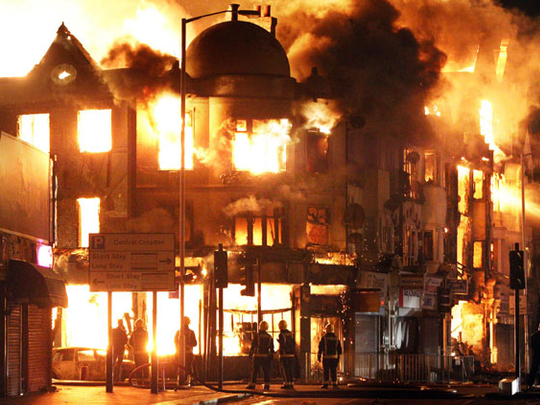
Nothing excuses the violence and looting that began in Tottenham on Saturday night and has since spread to other areas of London. The vast majority of people in Tottenham are law-abiding and peaceful, but the violence doesn't reflect that.
With the power of media and new technology to quickly incite people to gravitate towards the area, it would appear many came from outside not for any political agenda nor the peaceful protest led by Mark Duggan's family, but for the destruction that came after.
But there are questions to be asked about the handling of the initial protest and its aftermath, and the treatment of the family of Duggan, killed by police.
Had the Independent Police Complaints Commission (IPCC) been involved with the family earlier, they might not have had to launch their protest. And could the police have been more helpful by ensuring that there was a senior officer ready to speak to the family when they marched to the station?
The fact that the acting Met commissioner is now ready to speak to relatives is too little, too late: the family were kept waiting for five hours with no word from the police or the IPCC.
Yet what is clear is that plenty of people were ready to act on the back of this peaceful protest. On Sunday morning, residents' homes, lives and businesses lay in ruins.
We are looking at a group of people disaffected by historical inequality: a high level of poverty and generational unemployment. And young black people are still more likely than white people to be stopped and searched.
The catalyst for the initial, peaceful protest reflects something much deeper in the psyche of the community — the historical sense of injustice at deaths in custody.
The police have been given increasing legal powers to use force widely. But this privilege has to be used wisely. The police can only do so with the consent of the community — such policing doesn't work otherwise.
Now you have a community demanding justice for what they see as yet another unjust death in custody. The situation hasn't changed in decades, they believe: the police seem to have difficulty keeping people alive when in detention, particularly black people.
So as we reflect on a multitude of reasons for the riots, there will have to be a multitude of responses. Time, money, investment and commitment to community unity will be needed to repair trust and to restore order and normal reality.
The irony is that the institutions and organisations particularly youth services that could help rebuild relationships between the police and the community are faced with unprecedented funding cuts.
Policing methods
Specialist officers from Operation Trident were attempting to carry out an arrest when Duggan died. Trident is the flagship policing unit that leads the way on ‘intelligence-led policing' to support vulnerable victims and their families, to tackle head-on the perpetrators of murders and serious violence.
And it emerged from the community in the first place: A response to calls for police to tackle the disproportionate effects of gun crime on the black community.
What has happened has highlighted the volatility of that relationship. It took many years for the police to heed the cry for a dedicated investigative unit: Shootings had often been unresolved in a community too frightened and lacking trust in the police to come forward with information.
People were literally getting away with murder because of the culture of fear and silence. That had changed. The shooting of Duggan and its aftermath threatens to destroy all that years of progress have achieved.
Think back, too, to 1985 and the Broadwater Farm uprising. Are we still talking about an area so fractured, steeped in inequality and disadvantage that a significant minority have no pride in their community and don't want to protect it?
Those mindless thugs that destroyed people's businesses and livelihoods clearly had no sense of valuing their own surroundings unless it was just a mob coming from elsewhere to cause destruction. But you have to ask the questions today: Has the UK addressed the root causes or just paint over the cracks?
Too many in Tottenham still face poverty, unemployment, and crowded housing. The haves and have-nots live side by side in London — there are wealthy areas in Haringey, yet the parts destroyed were at the heart of the ordinary community.
Duggan's family has a right to answers. The IPCC needs to adopt the same sensitivity in its intervention with the family that has been learned by police in the last 25 years. Otherwise communities will continue to think they are over-policed as criminals and under-policed as victims.
— Guardian News & Media Ltd
Claudia Webbe is the chair of Positive Action Training, which provides a pathway to employment for black and minority ethnic communities.









